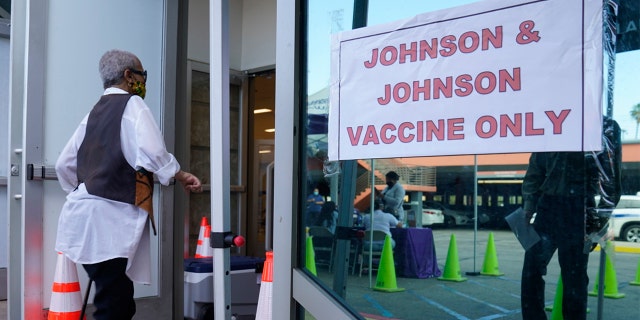
Dr. Siegel expects ‘big’ COVID vaccine uptick following full Pfizer approval
Fox News medical contributor Dr. Marc Siegel breaks down the impact of the FDA giving full approval and a name to the Pfizer vaccine.
Johnson & Johnson said Wednesday that a second dose of its COVID-19 vaccine was found in a study to generate a strong immune response, justifying a booster shot after eight months.
The Centers for Disease Control and Prevention has said it expects single-dose J&J vaccine recipients would need boosters but has held off on making recommendations as it awaits more data. Wednesday’s findings are expected to inform the U.S. booster strategy set to begin in September, when the U.S. plans to begin offering boosters to people who received messenger-RNA vaccines. Later it is likely to expand the program to include J&J’s viral-vector vaccine.
J&J said researchers found antibody levels increased ninefold among people who received a second dose of its vaccine, compared with one month after they received a first dose. The company didn’t specify exactly when or how many subjects received the second dose, though information posted about the clinical trial in an online government database indicates it was administered six months after the first shot.
J&J said that it will submit data from two studies to a preprint server, meaning that the data haven’t been peer-reviewed or published in a scientific journal.
J&J also said a booster is needed after eight months based on interim data it reported in the New England Journal of Medicine in July, which showed strong antibody responses through eight months after immunization with the J&J one-dose shot.
“We look forward to discussing with public health officials a potential strategy for our Johnson & Johnson Covid-19 vaccine, boosting eight months or longer after the primary single-dose vaccination,” Dr. Mathai Mammen, global head of R&D at Janssen Pharmaceutical Cos. of Johnson & Johnson, said Wednesday.
The Biden administration said last week that people ages 18 and older who got the Covid-19 vaccines from Pfizer Inc. or Moderna Inc. should get an extra dose eight months later, reflecting heightened concern over the highly contagious Delta variant and data showing initial immunity to Covid-19 diminishes over time. J&J’s suggested timeline would be in sync with that broader strategy.

People walk in to get their COVID-19 vaccine at the Baldwin Hills Crenshaw Plaza in Los Angeles.
(AP Photo/Damian Dovarganes)
Currently boosters are only authorized for immunocompromised people who received two-dose messenger-RNA vaccines. The Food and Drug Administration must authorize extra doses before they can be offered more broadly as recommended by the Biden administration to those 18 and older who received two-dose messenger-RNA vaccines, and it is expected to do so before Sept. 20, when health authorities said messenger-RNA boosters would become available
The CDC’s expert advisory panel on vaccines will meet next week to discuss the Biden administration’s plans for booster shots.
The J&J vaccine is authorized for emergency use in people 18 and older. Only Pfizer and partner BioNTech SE’s vaccine is fully approved by the FDA for those 16 and older. Moderna’s two-shot messenger-RNA vaccine has emergency authorization for people 18 and over.
Nearly 14 million people in the U.S. have received a single-dose J&J vaccine, according to CDC data.
“The single-dose vaccine is still highly protective, and we know that — that is not diminished, but now we also know that a second dose given at six months boosts immune responses substantially,” said Dr. Dan Barouch, who contributed to the development of the J&J vaccine but wasn’t directly involved in the booster information shared Wednesday. He was part of the New England Journal of Medicine study showing the vaccine’s protections held for eight months.
Use of the J&J shot dropped after U.S. health authorities in April temporarily paused rollout of the shots to investigate reports of a rare blood-clotting condition.
The company added a warning to its label in July saying its vaccine is linked to a very small incidence of cases of a rare neurological disorder seen with other vaccines or viral infections, called Guillain-Barré syndrome.
Early studies have mostly shown that J&J’s vaccine holds up well against the Delta variant. A recent study from South Africa including nearly 480,000 healthcare workers found that the J&J vaccine has an efficacy of up to 71% against hospitalization resulting from the Delta variant, 67% against hospitalization from the Beta strain and up to 96% against death overall, though another study suggested a single dose elicited a relatively weak antibody response against Delta.
J&J is also studying the efficacy of two doses of its vaccine, in an effort separate from the results released Wednesday. That data will analyze two shots given closer together, rather than the six-month interval of a booster dose.
Source: Read Full Article
